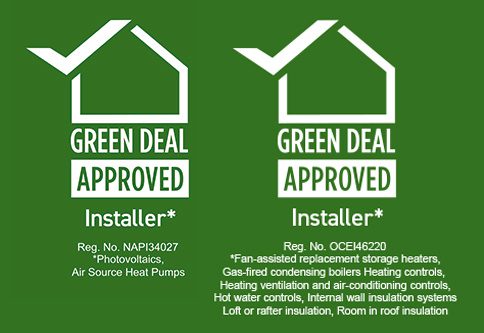The UK Government has already set the goal of making the country carbon neutral by 2050, but meeting this target will be difficult when home heating accounts for such a large proportion of the country’s carbon emissions.
Unfortunately, it isn’t likely that this will change any time soon. Gas boilers are the most commonly used heating systems in the UK and only 15% of British households currently have low-carbon alternatives. These are systems like air source heat pumps.
First, what is a Heat Pump?
Fresh air is pulled into the heat pump by a fan on the front of the unit. It is then compressed and turned into heat. Using electricity, but by using heat from the air; they use less electricity than a traditional boiler- creating renewable energy for your home.
Using renewable sources to heat your home is more sustainable than fossil fuels. They don’t produce carbon monoxide, don’t contribute towards green house gases or harm the ozone layer; saving you money in the long run!
Gas Boilers vs Heat Pumps, let’s compare!
Seventeen million homes in the UK rely on a gas boiler for their home heating. The majority of these properties don’t have access to the gas network. Thus, low-carbon heat pumps are an important part of the government’s goal to achieve zero net carbon emissions. As a result of these restrictions, gas boilers have become subject to strict regulation, such as a ban on non-condensing boilers, mandating that all new boilers be at least 90% efficient, as well as a complete ban on gas boilers in all new homes from 2025.
However, many people believe the push for a heat pump revolution is fundamentally flawed, due to the expensive and challenging installation. For that reason, some people say it is more sensible to invest in hydrogen boilers that can make use of an existing gas network than it is to change the whole heating system, hence why the hydrogen boilers favoured by many industry commentators are easier to transition to.
As for these, heat pumps and gas boilers are rather different. So we are going to show you how they stack up against each other.
This year, around 30,000 heat pumps will be installed. Over 1,000,000 gas boiler will fitted in that same period.
Installation complexity compared
Gas boiler installation
There are many Gas Safe Engineers ready to install gas boilers as quickly as 24 hours (when using a platform like Heatable).
Psst. Need a new boiler? Get a FREE non-obligatory quote – ‘click here’
Heat pump installation
With less demand for heat pumps and less experienced technicians available to work on them, it can take longer for installers to install them. They also cost more to buy and install than gas boilers.
When installed, air source heat pumps take a few days longer than gas boilers (approximately 2 to 3 days).
Upfront costs compared
Gas boiler prices
A gas boiler installation is, in terms of cost, generally is not too expensive. At an average of between £1,500 and £3,000, and as such is one of the cheaper forms of home heating available.
To learn more about how new boilers work, see our comprehensive guide.
Heat pump prices
In many cases, heat pumps are very expensive and difficult to install on their own. In comparison, ground source heat pumps and installation can cost from £18,000 to £25,000. but don’t forget to check out the Boiler Upgrade Scheme or talk to our experts about today for help with upgrading to a heat pump.
Running costs compared
Gas boiler running costs
The average annual boiler uses 13,600 kWh of electricity and the average gas bill in 2020 was £557 (and £706 for electricity). Currently, electricity is much more expensive than gas, resulting in a much higher running economy. For example, electricity costs between 3-16p per kWh as opposed to gas’ 3-4.
The government has been criticised for raising the electricity environmental levy, so that air source heat pumps are costlier than gas boilers.
Heat pump running costs
Heat pumps run off of electricity, and for every 1kWh of heat they provide, about 25% comes from electricity. While the other 75% comes from the air or the ground. So they are highly efficient. Which is why it is essential to do an energy audit prior to installing the pump, again adding to the complication of installing one. Doing an audit of your insulation, air conditioning, tariffs, and property size would take up much of your time.
That said, the Renewable Heat Incentive (RHI) could provide financial relief for homeowners. The Renewable Heat Incentive (RHI) is a government-funded scheme that enables households to receive a set amount of money in exchange for heat from eligible renewable heating systems. With the RHI set to be replaced by the Clean Heat Grant in April of 2022, families will no longer receive an ongoing payout as they will only receive a set grant at installation of the system.
If they’re installed in a home with poor thermal efficiency, the running costs can be extremely high, especially in comparison to gas.
Efficiency compared
Efficiency refers to the amount of heat energy that is converted from fuel.
Gas boiler efficiency
Modern A-rated gas boilers are 90% efficient, meaning that it can convert 90% of the energy it consumes into heat energy. Only 10% is then lost in the flue pipe for every £1 spent on heating.
Heat pump efficiency
Ground source heat pumps can have efficiency ratings exceeding 400%. While air source heat pumps have efficiency ratings of around 300%. As a result, it will generate 3 to 4 times as much heat for every 1kWh of electricity used. In heat pumps, the efficiency is measured by the COP (Coefficient of Performance) or SCOP (or Seasonal Coefficient of Performance). For example, 3.25 SCOP means that three kW of heat is produced for every one KW of electricity.
Get £5, 000 cashback when you upgrade to a heat pump- ‘click here‘ to talk to an expert today!
Performance & heat output compared
Gas boiler performance
It’s cheaper to use a gas furnace instead of a heat pump, as they are more fuel efficient. They produce consistent heat, and they require very little startup time. In this example, boilers have a high temperature of 70°C, while air source heat pumps have a radiator system and water with a temperature range of between 35°C and 45°C.
Heat pump performance
As opposed to conventional boilers, heat pumps produce lower temperatures, so it’s advisable to use them over a longer period of time for the best efficiency. They can only be used in homes that have enough insulation and drafts. Add to that the fact that large radiators won’t be enough to heat the house because they’re inadequate.
Carbon footprint compared
Gas boiler carbon emissions
The CO2 emissions from a modern A-rated gas boiler are 215 grams per kWh. In comparison to non-condensing boilers of the past, these condensing boilers are much more environmentally friendly.
By replacing your old boiler with a modern condensing boiler, you could save up to 1,220 kg of CO2. Smart home technologies adaptable learning schedule means you can save up to £75 and 330kg of carbon per year when paired with a smart thermostat and thermostatic radiator valves.
Heat pump carbon emissions
The heat pump itself uses electric power as the sole source of energy, making it a zero-carbon heating device. While that does not mean the electricity used in it was generated cleanly. Considering 40% of electricity generation in the UK comes from renewables, it is certainly better for the environment than gas boilers.
Heat pumps are zero-carbon. But, they run on electricity from the grid, where only ~40% is generated green.
Talk to us today
Wether you are thinking about upgrading to a heat pump or wanting a boiler replacement- we are here to help!











